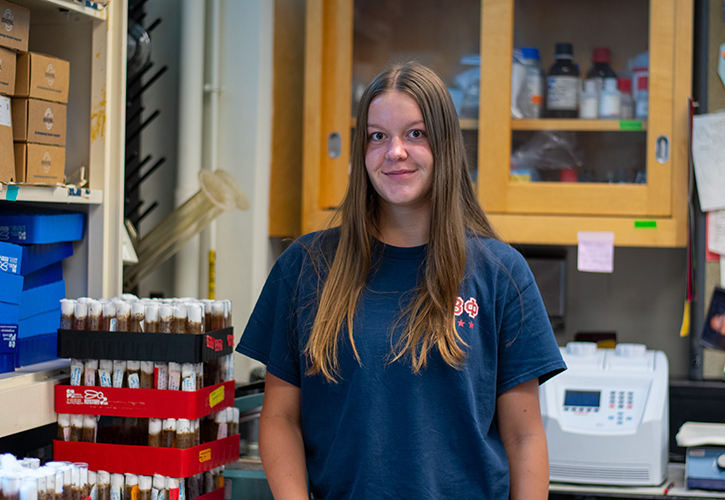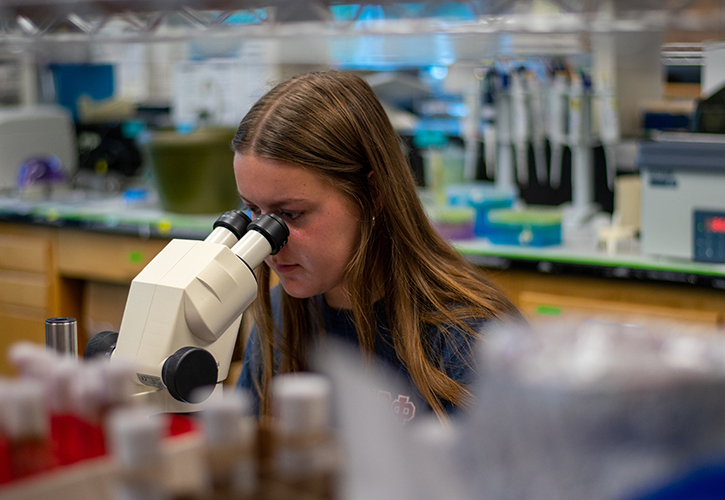College of Arts and Sciences Newsroom

University of Dayton undergraduate biology researcher awarded honorable mention for presentation at MidWest Drosophila meeting
By Allison Brace ’22
University of Dayton senior Hannah Darnell was one of two undergraduate students selected to present research at the 2021 Midwest Drosophila Conference in October at Indiana University in Bloomington. She was awarded honorable mention for her presentation.
Darnell, a biology major from Plainfield, Illinois, studied human eye development in the lab of faculty mentor Amit Singh, professor of biology, through the ISE Summer CoRPs research fellowship program.
Darnell was accepted into the ISE Summer CoRPs for the 2021 summer term and worked on Singh’s team full-time outside of the traditional academic year.
She presented her research at the conference via Zoom. She also plans to present it at the University’s Stander Symposium and the annual Drosophila Conference organized by Genetics Society of America (GSA) in San Diego in April.
Working with graduate and undergraduate researchers, Darnell spent the last year testing genetic eye development factors during various stages of a fruit fly’s 12-day lifespan to find the cause of a birth defect in the human eye known as small eye syndrome.
Scientists use fruit flies to model human diseases at the cellular and molecular levels because they share the same genetic machinery. The fly’s entire life cycle is just 12 days, which allows researchers to study the transmission of hereditary traits and investigate the genetics of disease across at least 24 generations in a year.
“I first learned about Dr. Singh’s work through applying for the Integrative Sciences and Engineering (ISE) CoRPs Summer Fellowship,” Darnell said. “I have always had an interest in human development, so Dr. Singh’s research naturally piqued my interest. I applied and was accepted into the fellowship program for the summer of 2020, however, the program was canceled due to the COVID-19 outbreak. I then reached out to Dr. Singh and began doing some work in his Drosophila Development and Disease lab during the 2020-2021 school year in preparation to reapply for the ISE fellowship for the summer of 2021.”
In August 2021, Singh and biology professor Madhuri Kango-Singh were awarded a $1.6 million National Institutes of Health grant to study how genes regulate three-dimensional patterning and growth during early eye development to understand the genetic basis of childhood retinal diseases and birth defects in the human eye.
The ISE Summer CoRPs program offers a 10-week immersive STEM research experience for undergraduates in a variety of disciplines. The program provides student accommodations including housing and a stipend for the duration of the experiential learning opportunity.

When Darnell began volunteering in the lab in fall 2021, she shadowed graduate assistant Anuradha Chimata Venkatakrishnan to better understand the scope of the project. She also spent time watching videos and reading about the different techniques that she would soon be using to do her own experiments in the lab.
“When I began working in Dr. Singh’s lab I had no knowledge or understanding of any of the functions of the lab, especially relating to the flies,'' Darnell said. “I am so thankful to Anuradha for willingly taking time away from her own experiments to help make sure that I understood and was able to successfully run experiments on my own.”
The project is funded by a National Institute of Health (NIH) grant led by Singh. He works alongside co-principal investigator Kango-Singh, director of the graduate program in biology.
Their goal is to gain better insights into eye formation, including birth defects associated with a particular transcription factor — a protein involved in controlling expression of other genes.
“Hannah is working on understanding how a transcriptional pausing factor, Motif 1 Binding Protein (M1BP), regulates eye development using a Drosophila melanogaster eye,” Singh said, using the Latin term for fruit fly. “These studies have significant bearings on human eye development. Hannah is looking at the highly conserved JNK signaling pathway to see how the altering of M1BP, gene suppression, can change eye development in both flies and humans.”
Both Singh and Chimata Venkatakrishnan acted as mentors throughout the fellowship, meeting weekly to talk through research, answer questions and offer support throughout the program. Mathematical modeling and statistical analysis support was provided by Muhammad Usman, professor of mathematics.
Darnell was also supported by a cohort of other students and multidisciplinary faculty teams throughout her fellowship. As a part of the program, undergraduate students from different research disciplines met weekly with Doug Daniels, chemistry professor and executive director Integrative Science and Engineering Center, and other workshop facilitators. The students engaged in professional development exercises that covered topics such as interviewing, scholarships and presenting their work. At the end of the summer, the fellows had the opportunity to present their research to a panel of peers and faculty.
“I am impressed every year by the amount the CoRPs students learn, grow and achieve over the course of one summer,” Daniels said. “These undergraduate researchers, many of whom have never conducted independent research before, make significant progress on authentic STEM research challenges with multidisciplinary faculty teams. With substantial programming on scientific communication facilitated by subject matter experts, the students also become adept at conveying their motivation, goals and accomplishments to a range of audiences in a matter of weeks.”
Darnell’s research will be published in a peer-reviewed journal among other research around fruit flies and human eye development.
“For me, this experience has opened my eyes to a passion for research I hadn’t known I had beforehand and wouldn’t have found without being given the opportunity to be involved in this lab,” Darnell said. “Additionally, the research base that I have gained through my work in Dr. Singh’s lab will help me to excel in my future education, as well as in future research in the field of genetics and human development.”
Darnell plans to attend graduate school for reproductive medicine and later become an embryologist working in a fertility laboratory.
“Hannah is truly passionate about biology and helping others in her community,” Singh said. “This opportunity of performing research in a lab will help her achieve her goal of doing biomedical research in future.”
For more information, visit the Department of Biology and the Integrative Science and Engineering Center websites.
